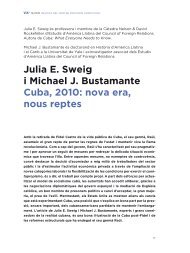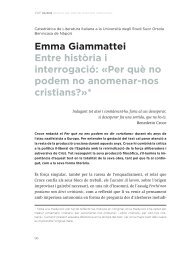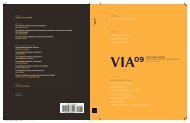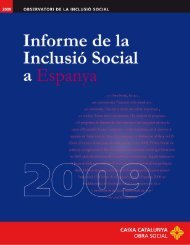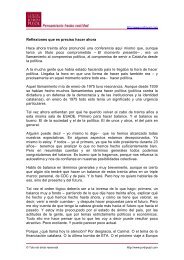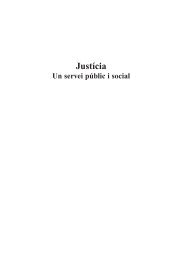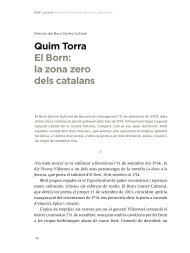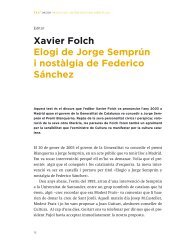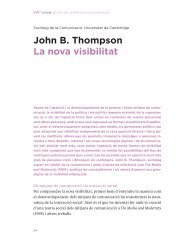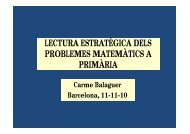Descarregar en format PDF - Jordi Pujol
Descarregar en format PDF - Jordi Pujol
Descarregar en format PDF - Jordi Pujol
Create successful ePaper yourself
Turn your PDF publications into a flip-book with our unique Google optimized e-Paper software.
Abstracts<br />
over the last two decades, in which<br />
polarisation of the PP and the PSOE has<br />
gradually established itself, have tak<strong>en</strong> on a<br />
role of und<strong>en</strong>iable political c<strong>en</strong>tricity, both<br />
with regard to their actions in Spanish<br />
politics and also by opting for an ideologically<br />
c<strong>en</strong>tral position.<br />
Liberal Ideas and R<strong>en</strong>ewing Politics<br />
Monique Canto-Sperber<br />
Monique Canto-Sperber, moral and political<br />
philosopher (L’inquiétude morale et la vie<br />
humaine, 2001), is a member of the CNRS and<br />
of the C<strong>en</strong>tre de Recherches Politiques<br />
Raymond Aron of the École des Hautes Études<br />
<strong>en</strong> Sci<strong>en</strong>ces Sociales in Paris. Although she has<br />
sometimes be<strong>en</strong> considered as being akin to<br />
the more social-democratic positions of<br />
Dominique Strauss-Khan and Michel Rocard,<br />
Canto-Sperber has dedicated a significant<br />
part of her most rec<strong>en</strong>t work to r<strong>en</strong>ewing and<br />
defining a social-liberal line of thought based<br />
on political theory. In this respect, Canto-<br />
Sperber is the author of work such as Le<br />
socialisme libéral. Une anthologie: Europe-Etats-<br />
Unis (2003), Les règles de la liberté (2003) and<br />
Faut-il sauver le libéralisme? (2006). In this<br />
article, she talks about what she considers to<br />
be the ess<strong>en</strong>ce of a social-liberal movem<strong>en</strong>t<br />
and point of view: the conflation betwe<strong>en</strong> the<br />
active def<strong>en</strong>ce of individual freedom and the<br />
awar<strong>en</strong>ess that it is in a community, within a<br />
cohesive society, that personal autonomy can<br />
be made manifest.<br />
The Complicated and Exciting Future<br />
of Liberalism<br />
Antonio Garrigues Walker<br />
Liberalism has be<strong>en</strong> capable of adapting to<br />
the major trans<strong>format</strong>ions of past and<br />
pres<strong>en</strong>t with much more speed and effici<strong>en</strong>cy<br />
than socialism or conservatism, both of<br />
which have oft<strong>en</strong> limited themselves to taking<br />
on the liberal ideas that have convinced them<br />
184<br />
most at any particular time, to define and<br />
apply to certain public proposals and policies.<br />
This is just one of the conclusions that the<br />
author def<strong>en</strong>ds in an article with a marked<br />
tone of assessm<strong>en</strong>t and the summarising of<br />
his own life and experi<strong>en</strong>ces in the political<br />
ar<strong>en</strong>a. Today, liberalism is a tr<strong>en</strong>d of thought<br />
that is capable of providing suitable responses<br />
at a time wh<strong>en</strong> dogmatic pretexts are lacking.<br />
However, the ideological triumph of<br />
liberalism has never be<strong>en</strong> translated, not ev<strong>en</strong><br />
today, into perceptible political profit on the<br />
part of political parties of a reformist, liberal<br />
or c<strong>en</strong>trist nature. There are various ways of<br />
providing an explanation, more or less<br />
reasoned, for this ph<strong>en</strong>om<strong>en</strong>on and<br />
Garrigues Walker deals with each one<br />
explicitly. In the case of Spain, however, the<br />
problem is more complex, with certain<br />
singularities that the author outlines in<br />
detail, such as the country’s difficulty in<br />
overcoming a political debate that is couched<br />
exclusively within left-right dialectics,<br />
resulting in the political c<strong>en</strong>tre, rather than<br />
being a position in its own right, repres<strong>en</strong>ting<br />
a particularly unstable point of balance.<br />
Tony Blair: T<strong>en</strong> Years of New Labour<br />
Montserrat Guibernau<br />
This new article by Montserrat Guibernau can<br />
be considered as the second part, or<br />
continuation, of the article she published in<br />
VIA 01 <strong>en</strong>titled Tony Blair: Leadership as Vocation.<br />
On that occasion the author focused on the<br />
figure of one of the und<strong>en</strong>iable leaders of the<br />
last decade in Europe. In this new text she<br />
weighs up and reviews in detail the broad<br />
lines established by New Labour and on which<br />
it based itself, the origins of which lie in the<br />
Third Way, as outlined by Anthony Gidd<strong>en</strong>s,<br />
author of Beyond Left and Right: The Future of<br />
Radical Politics (1994) and The Third Way: The<br />
R<strong>en</strong>ewal of Social Democracy (1998). Although<br />
she states that, sometimes, New Labour<br />
appeared merely to be doing the opposite to<br />
what Old Labour would have done, Guibernau



